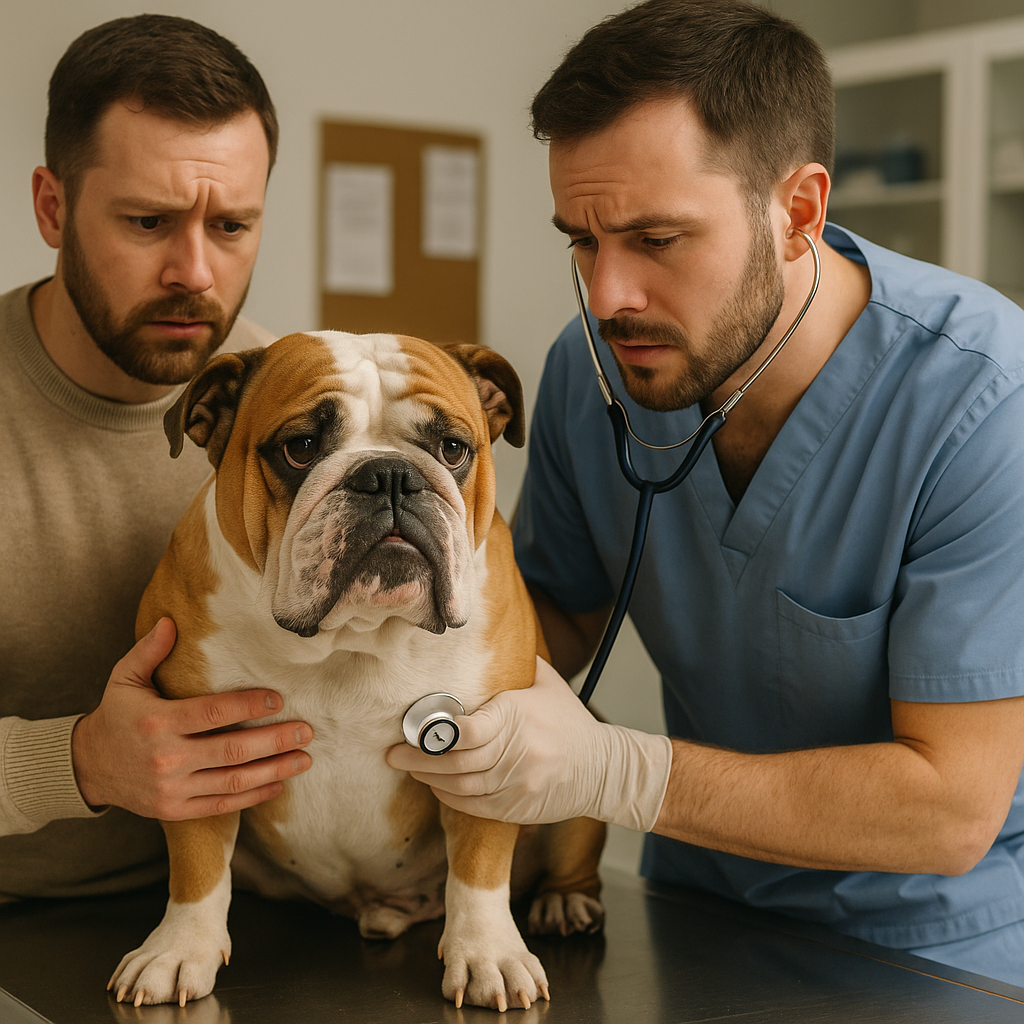The bulldog is a charming, loyal, and calm breed, but it also has physical characteristics that require special health attention. Since dogs can’t speak, they depend entirely on the careful observation of their owners to ensure any sign of trouble is noticed in time. Knowing when it’s the right time to take your bulldog to the vet can make the difference between a simple treatment and a serious emergency.
Many warning signs can go unnoticed because they are subtle, especially in a naturally calm and resilient breed like the bulldog. Understanding what is considered normal in your dog’s daily routine and what should raise concern is essential to act responsibly and ensure their well-being.
The first point to consider is that a vet visit should not only happen when the bulldog is sick. Routine checkups are essential for disease prevention and for monitoring the dog’s development. For adult dogs, ideally, they should visit the vet at least once a year. In the case of puppies and senior dogs, the frequency should be higher, with visits every six months or as recommended by the professional.
In addition to routine checkups, there are specific signs that indicate your bulldog needs an urgent veterinary evaluation. One of the most common is a change in appetite. If your bulldog stops eating for more than 24 hours or eats significantly less than usual for more than two days, this could indicate dental problems, infections, abdominal pain, or other illnesses that require immediate diagnosis.
Behavioral changes are also an important alert. If your bulldog, who is normally sociable and playful, becomes apathetic, withdrawn, or shows aggression without apparent reason, something might be wrong. Often, behavioral changes are the first signs of pain, discomfort, or stress.
Respiratory problems are very common in bulldogs due to their brachycephalic anatomy. Therefore, any breathing difficulty, exaggerated snoring, panting at rest, wheezing, or frequent gagging should be evaluated as soon as possible. These symptoms may be related to airway obstructions, tracheal collapse, infections, or even pulmonary edema.
Another sign that should not be ignored is the presence of vomiting or diarrhea, especially when it lasts more than 24 hours or is accompanied by other symptoms such as fever, lethargy, dehydration, or blood in the stool. The bulldog’s digestive system can be sensitive, and simple problems can quickly worsen if not treated in time.
Skin health also deserves attention. Bulldogs have many folds that must be cleaned frequently. If you notice redness, bad odor, discharge, persistent itching, or hair loss, it could be dermatitis, a fungal infection, or an allergic reaction. The vet can prescribe the best treatment to prevent the problem from spreading.
Eye health should also be closely monitored. Bulldog eyes are naturally more exposed and are therefore more susceptible to trauma, ulcers, conjunctivitis, and other inflammations. If you notice red eyes, excessive tearing, discharge, sensitivity to light, or frequent scratching, it’s time to seek professional help.
Ear care is also essential. Bulldogs are prone to ear infections, especially if exposed to moisture, dust, or allergies. Itching, bad odor, discharge, or head tilting may be signs of an ear infection that requires specific veterinary treatment to avoid complications.
Another point that deserves emphasis is signs of pain. A bulldog in pain may whimper, change behavior, avoid stairs, limp, have difficulty lying down, or even refuse to walk. Although these signs may seem minor, they should never be ignored. Pain may indicate anything from muscle injuries to serious joint issues or internal diseases.
Besides the symptoms mentioned, there are specific situations that require immediate veterinary attention, such as poisoning, trauma, falls, bleeding, seizures, difficulty urinating, sudden swelling, fainting, changes in gum color (especially if they become very pale or bluish), and neurological changes. In any of these cases, do not wait for improvement. Take your bulldog immediately to a trusted vet.
It is also important to consider dental health. Many owners don’t realize that tooth or gum pain can cause the dog to eat less, become irritable, or even aggressive. Bad breath, tartar buildup, darkened teeth, or bleeding in the mouth should be examined by a professional.
Another essential recommendation is to keep all vaccinations and deworming up to date. Diseases like distemper, parvovirus, and leptospirosis can be prevented with a proper vaccination schedule. Deworming also helps prevent intestinal and parasitic diseases that affect the dog’s overall health.
Also, don’t forget about flea and tick prevention. Infestations with these parasites can cause serious illnesses like ehrlichiosis and babesiosis, which affect the bulldog’s blood and organs. Using appropriate antiparasitics and consulting the vet about the best form of protection should be part of your responsible care routine.
As the bulldog ages, care should intensify. Senior dogs need regular blood tests, kidney and liver function monitoring, heart evaluations, and closer attention to any behavioral changes. Problems such as arthritis, heart failure, diabetes, and cataracts are more common in old age and require continuous management.
In summary, taking your bulldog to the vet at the right time can save lives and ensure a better quality of life for your companion. The earlier a condition is diagnosed, the simpler the treatment will be. Prevention, careful observation, and love are the pillars of canine health.
